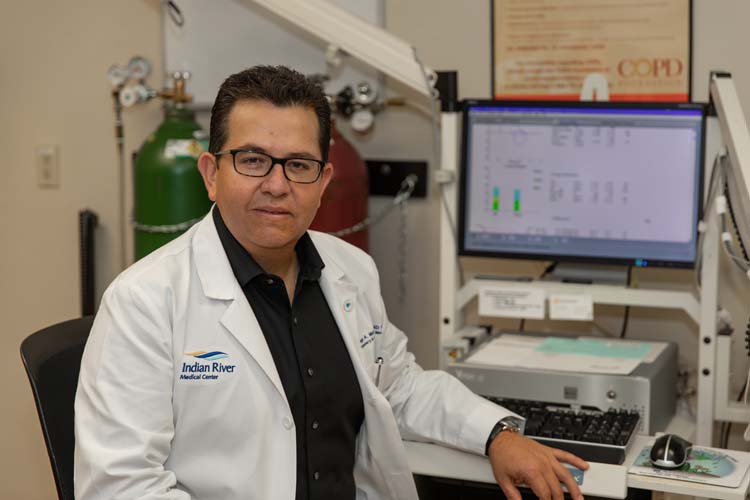Dr. Diego Maldonado, a pulmonologist and critical care specialist at Indian River Medical Center, is among a growing chorus of doctors trying to spread awareness about a new generation of asthma drugs.
Biologics.
These drugs target a specific type of inflammation that affects a majority of asthma patients.
According to the National Institutes of Health, “asthma is the result of an exaggerated immune response.”
As NIH explains, “when the mucous membranes lining the lungs come into contact with certain irritants, the muscles of the airways contract. Typical symptoms include episodes or ‘attacks’ of wheezing, coughing and shortness of breath.”
Roughly 25 million Americans – including 7 million children – suffer from some form of asthma, and Asthma.net says these allergic reactions are responsible for nearly 2 million emergency department visits each year. Of those 2 million ER visitors, some 439,000 people are admitted to the hospital.
Another grim statistic: 3,400 people die from asthma attacks each year in the United States.
Until quite recently, says Maldonado, the first – and sometimes only – line of defense against asthma attacks was high doses of inhaled corticosteroids such as prednisone.
However, as researchers at the Firestone Institute for Respiratory Health point out, prolonged use of corticosteroids is “associated with serious side effects, including multi-organ toxicities and suppression of the immune system.”
So, for years, respiratory scientists and physicians have been looking for an alternative – or, at the very least, an adjunct medication to reduce dependence on corticosteroids.
Now, according to Maldonado, “they came out with this idea called ‘eosinophilic asthma phenotypes.’ They started measuring eosinophil levels [particularly interleukin five] in the patient’s blood.”
Eosinophils are a type of inflammatory cell and Maldonado says patients who have elevated levels of eosinophils are possible candidates for these biologic medications.
That is good news since, according to research, a majority of adults with asthma have eosinophilic asthma, also called e-asthma.
The biologic drugs that counter eosinophils don’t come in the inhalers people are familiar with seeing. Of these drugs – Fasenra, Nucala and Xolair – two are delivered by injection and one is administered intravenously.
Like most medications, these biologics come with risks.
“We give this therapy in what’s called infusion centers,” Maldonado says, because “they can create a lot of reactions. You know, local reactions, so they need to be observed for around 30 minutes or so.
“There’s a 1 percent chance of developing an anaphylactic reaction” to these medications.
“Anaphylaxis is a severe, potentially life-threatening allergic reaction,” according to the Mayo Clinic. “It can occur within seconds or minutes of exposure to something you’re allergic to, such as peanuts or bee stings” or even to medications like these.
“And that’s what I have to explain to my patients,” Maldonado says. “Some of them ask, ‘Why can’t you give me [the shot] here? Why not do it in the doctor’s office?’ And the answer is because you need to be in a controlled environment,” where, if you were to suffer an anaphylactic reaction five, 15 or 20 minutes after you get the medicine, you could be treated with epinephrine immediately.
Current FDA regulations for Fasenra, Nucala and Xolair mandate that patients must be at least 12 years old for the shots and 18 years old or older for the IV. And they aren’t cheap.
Xolair can cost as much as $20,000 a year. Even with various pharmaceutical company programs and insurance, the out-of-pocket cost still runs somewhere around $200-to-$400 per month. Fasenra and Nucala can be even pricier at $15,000 to $35,000 a year.
And while Maldonado says Medicare will help cover the cost for its enrollees, that’s no help for younger patients.
Moreover, these new biologic drugs do not replace inhalers for those with asthma. Their job, in essence, is to help asthmatics reduce their intake of corticosteroids while – hopefully – improving overall breathing functions.
Dr. Diego Maldonado is the director of pulmonary service at the Indian River Medical Center. His office is at 3450 11th Court, Suite 306. The phone number is 772-794-5800.

